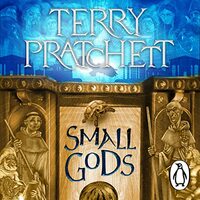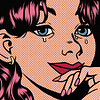Take a photo of a barcode or cover
I am (re)reading all Discworld novels: this is book #6 out of 41.
I enjoyed Small Gods. It is a witty mockery of an oppressive religion (think Catholic Church during the time of the inquisition), but it is also a deep analysis of human beliefs, faith, and ultimate desire to understand and explain the world.
Here, Terry Pratchett explores what gods are and how they came to be. This is much more tangible on Discworld: after all, gods are present here in everyday life, so atheists have a hard time not believing in them (or rather believing that they do not exist). But this is also not a one-sided relationship: gods need belief, this is what makes them powerful and without believers they simply die. This isn’t a particularly novel idea, but Pratchett wrote this wonderfully.
Pratchett also didn’t stop here. Here on Roundworld, Greek philosophy was partly a structured and logic-driven development of beliefs of ancient Greece, so Small Gods also ventures into Ephebe where we explore the relationship between beliefs, logical reasoning and truth.
(And we also explore the difference between subjective and objective truth a bit here, though obviously the church subverts what objective truth is in order to manipulate people.)
Pratchett takes this further by mocking the evolution of philosophy into natural philosophy (which later became mechanics and physics as we know it). Spoiler alert: not unlike in our world, this evolution doesn't always end well.
What a wonderful novel!
I enjoyed Small Gods. It is a witty mockery of an oppressive religion (think Catholic Church during the time of the inquisition), but it is also a deep analysis of human beliefs, faith, and ultimate desire to understand and explain the world.
Here, Terry Pratchett explores what gods are and how they came to be. This is much more tangible on Discworld: after all, gods are present here in everyday life, so atheists have a hard time not believing in them (or rather believing that they do not exist). But this is also not a one-sided relationship: gods need belief, this is what makes them powerful and without believers they simply die. This isn’t a particularly novel idea, but Pratchett wrote this wonderfully.
Pratchett also didn’t stop here. Here on Roundworld, Greek philosophy was partly a structured and logic-driven development of beliefs of ancient Greece, so Small Gods also ventures into Ephebe where we explore the relationship between beliefs, logical reasoning and truth.
‘You can’t believe in Great A’Tuin,’ he said. ‘Great A’Tuin exists. There’s no point in believing in things that exist.’
…
‘Sir, surely only things that exist are worth believing in?’ said the enquirer, who was wearing a uniform of a sergeant of the Holy Guard.
‘If they exist, you don’t have to believe in them,’ said Didactylos. ‘They just are.’
(And we also explore the difference between subjective and objective truth a bit here, though obviously the church subverts what objective truth is in order to manipulate people.)
Pratchett takes this further by mocking the evolution of philosophy into natural philosophy (which later became mechanics and physics as we know it). Spoiler alert: not unlike in our world, this evolution doesn't always end well.
‘How does it work?’ he said.
‘Very simple,’ said Urn. ‘The fire makes—’
‘We haven’t got time for this,’ said Simony.
‘—makes the water hot and so it gets angry,’ said the apprentice philosopher. ‘So it rushes out of the globe through these four little nozzles to get away from the fire. The plumes of steam push the globe around, and the cogwheels and Legibus’s screw mechanism transfer the motion to the paddles which turn, pushing the boat through the water.’
‘Very philosophical.’
What a wonderful novel!
Took me a while to wade through, it’s fun, the concept is fun, it’s just maybe not my thing aaaasss much
This is indeed a good "standalone" Discworld novel. It has less slapstick and hyperbolic humor, and more political and religious satire. If you have read Lamb by Christopher Moore, this book will likely be enjoyable.
It pokes fun a democracy and theocracy, as well as state religions in general, and contains veiled prods at both the Catholic Church and Islam. Most of it is in good fun, and no direct statements are made (names changed to protect the innocent, perhaps), but you will see the inflexibility of "orthodox" interpretations mocked and its injustices highlighted.
If you enjoyed the movie Dogma, this book will seem somewhat familiar.
It pokes fun a democracy and theocracy, as well as state religions in general, and contains veiled prods at both the Catholic Church and Islam. Most of it is in good fun, and no direct statements are made (names changed to protect the innocent, perhaps), but you will see the inflexibility of "orthodox" interpretations mocked and its injustices highlighted.
If you enjoyed the movie Dogma, this book will seem somewhat familiar.
challenging
hopeful
mysterious
reflective
medium-paced
Plot or Character Driven:
A mix
Strong character development:
Yes
Loveable characters:
Complicated
Diverse cast of characters:
Complicated
Flaws of characters a main focus:
Complicated
I really struggled with this one. The main reason I finished it is because I unexpectedly found myself in the hospital emergency room for five hours and had this in my bag, so I got through a big chunk of it then while waiting to be seen.
Especially the start was sluggish. I’m not keen on religion in general and I wasn’t enjoying the descriptions of the Omnian religion (sounded very much like the bad bits of Catholicism amplified) or Brutha as a character. The plot itself was chaotic - and this isn’t my first discworld novel so it’s not like I didn’t know that the books can be chaotic, but this just didn’t really click with me at all.
In the end I liked it ok. It wasn’t a bad book. It just wasn’t for me.
Especially the start was sluggish. I’m not keen on religion in general and I wasn’t enjoying the descriptions of the Omnian religion (sounded very much like the bad bits of Catholicism amplified) or Brutha as a character. The plot itself was chaotic - and this isn’t my first discworld novel so it’s not like I didn’t know that the books can be chaotic, but this just didn’t really click with me at all.
In the end I liked it ok. It wasn’t a bad book. It just wasn’t for me.
How is this the first work by Terry Pratchett that I ever read? This was genius. Recommend. Recommend. Recommend.
funny
reflective
medium-paced
Plot or Character Driven:
A mix
Strong character development:
Yes
Loveable characters:
Yes
Diverse cast of characters:
Complicated
Flaws of characters a main focus:
Yes
So good. I wasn't sure about it for the first 100 pages, but it became a masterpiece.
adventurous
funny
hopeful
lighthearted
reflective
medium-paced
Plot or Character Driven:
A mix
Strong character development:
Yes
Loveable characters:
Yes
Flaws of characters a main focus:
Yes
Its hard to go wrong with Terry Pratchett. Usually my favorites involve Captain Vimes or Moist von Lipwick, but this is a great one-off. Its upbeat and entertaining but also takes a close look at some of the potential the pros and cons of organized religion. Obviously these will be a bit different if your god can sit in your pocket and have a full conversation, but the overall points stand
"But why is it that the heathens and the barbarians seem to have the best places to go when they die?”
Read this awhile back and forgot to add it. Also re-read the Color of Magic. Yes, I want credit for that.




